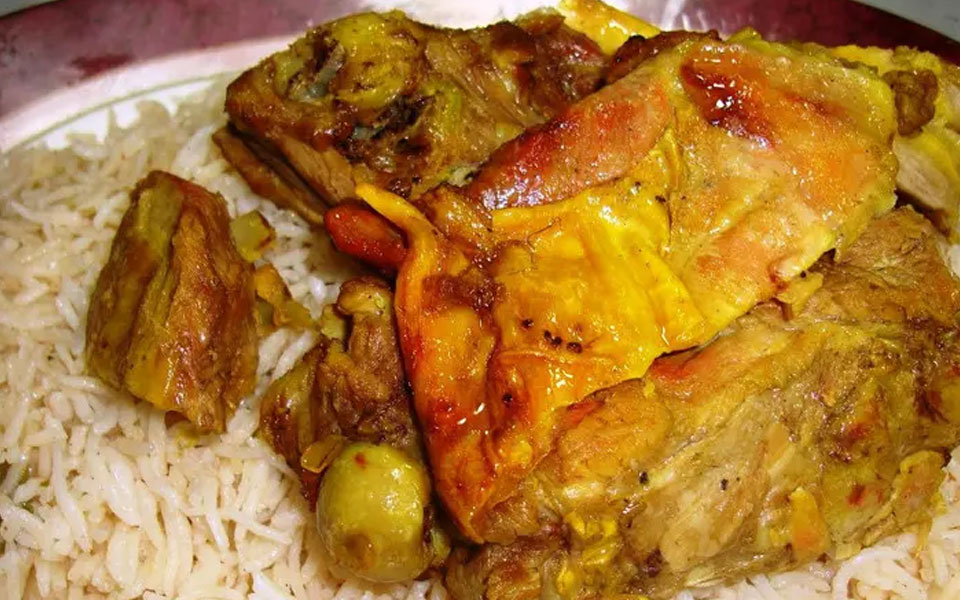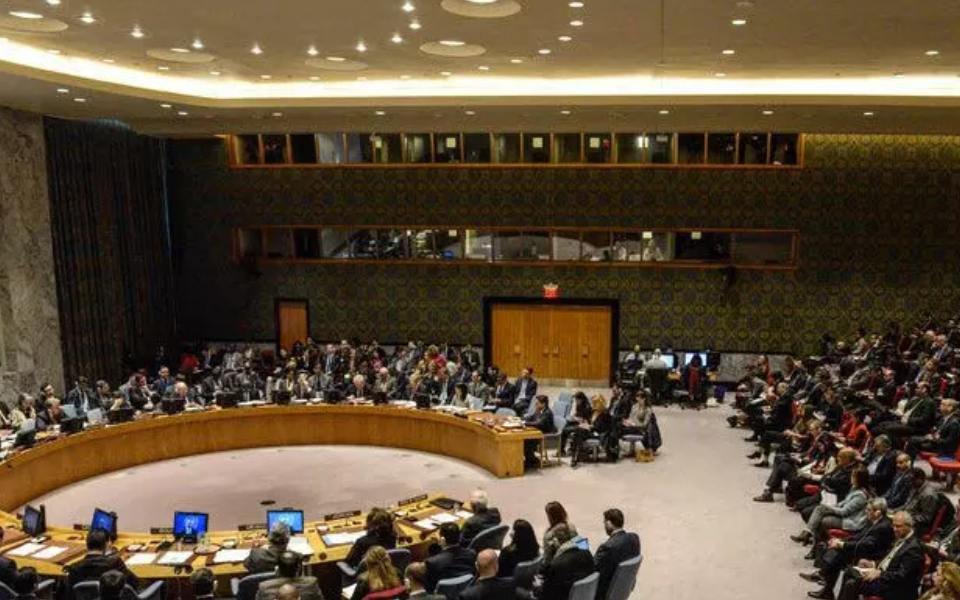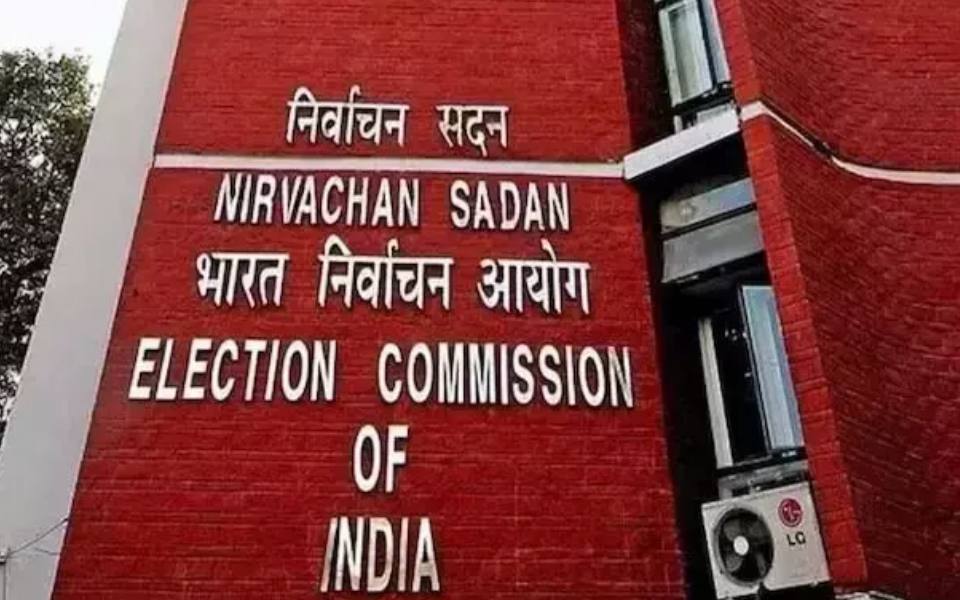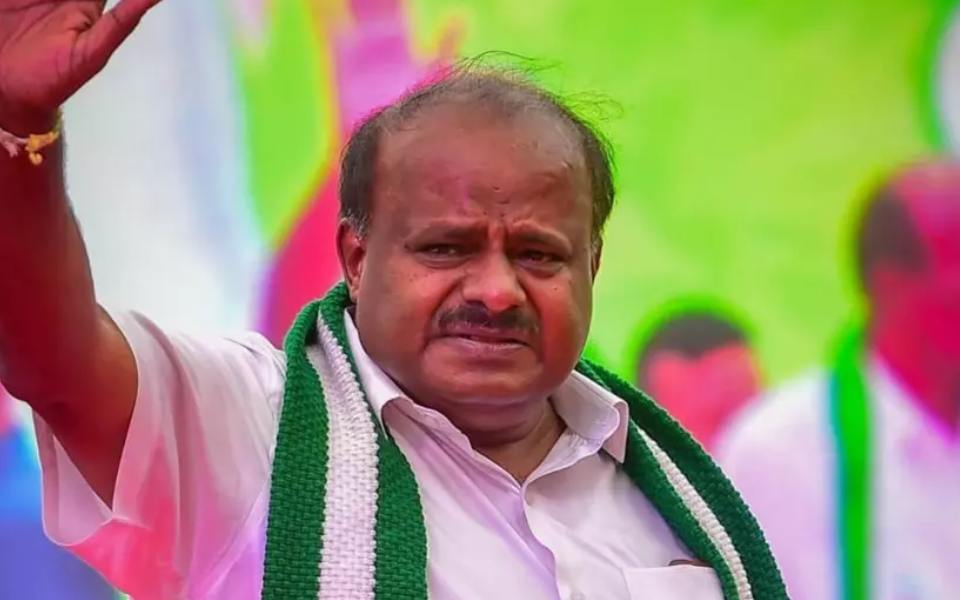Arabic food is turning out to be a hot trend in India these days due to obvious connection. GCC is home to around 7 million expatriate Indians. So their obsession with the Middle Eastern food comes as no surprise.
Little wonder then that restaurants serving Arabian food have sprung up in various parts of India, particularly in states like Kerala, Andhra Pradesh, Telangana, Tamil Nadu and Karnataka.
And in some hotels, even the décor and ambience is arabesque. The Arab custom of sitting comfortably on the floor carpet and eating from the same large platter is also part of some of these restaurants.
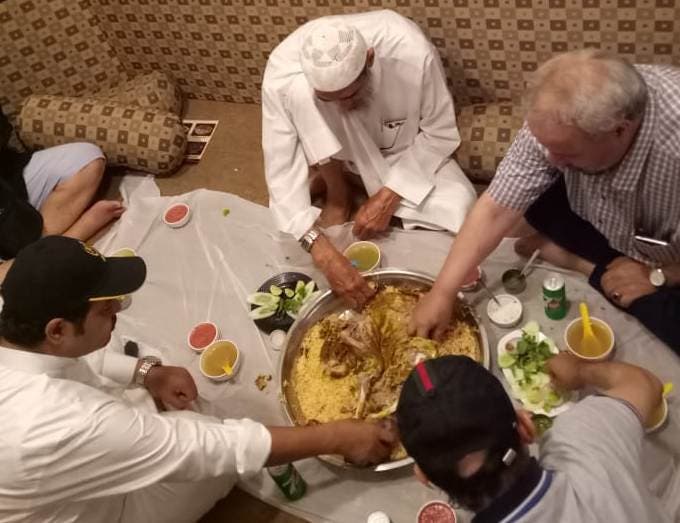
(The Arab custom of sitting comfortably on the floor carpet and eating from the same large platter is also part of some of these restaurants.)
Shewarma, the rotisserie chicken/mutton warp, has already made a rage in India. Select star hotels in metros have a collection of delights to choose from Arabic food on their menu for a long time but are often too expensive for a commoner.
So, in the recent past, cashing in on the interest of people who love feasting on Arabic food, restaurants are rustling up Arabian delicacies in substantial numbers in places like Mumbai, Chennai, Hyderabad, Kochi, Calicut, Bangalore, among others.
Hyderabad, which was once ruled by Muslims, leads in offering Arabic food to its residents and tourists. The historic city is also home to Hadhrami Arabs (from Yemen) whose culinary influences is distinctly visible.
Hyderabad’s old city area is a foodie delight with a good number of restaurants rustling up Arabian delicacies. Barkas and Yerrakunta suburbs, a 20-minute drive south of Charminar looks like a mini-Arab locality with hotel signage in Arabic greeting the visitors.
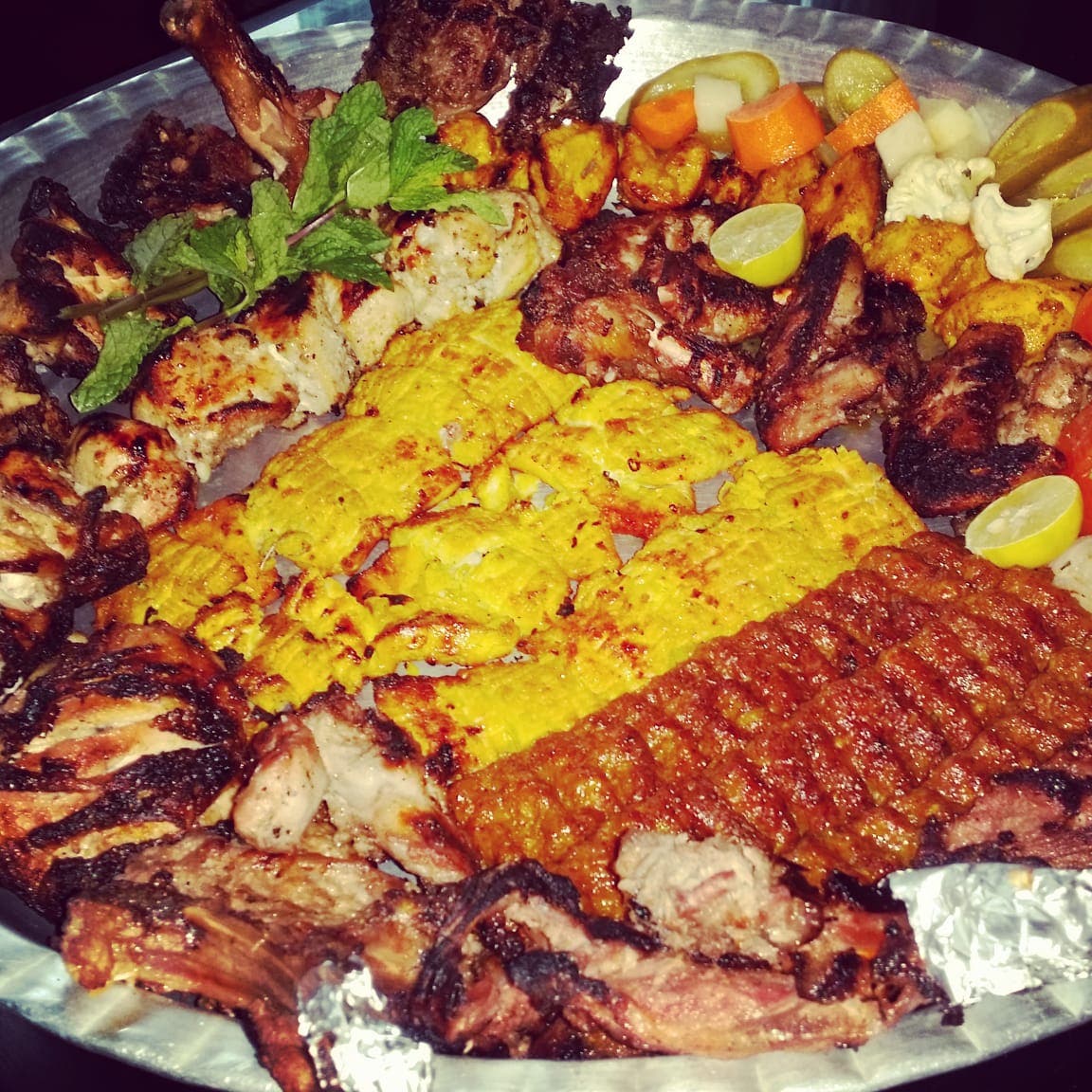
(In addition to the regulars like shewarma, falafel, grilled meats and machboos accompanied by khuboos and hummus, one can find Arabic salads like fattoush, tabbouleh and of course, mandi.)
There are many in the twin neighborhoods who trace their progeny to Hadramaut in Yemen, an Arab country. As one enters the locality, one is feasted with restaurant signs advertising mandi, a Yemeni rice dish cooked in a clay oven with lamb or chicken. Mandi has become an all-times favorite of such restaurants.
Sabyasachi Roy Chaudhuri, a food explorer and blogger, writes: “One of the Yemeni preparations, a dish which has become popular in Hyderabad is their traditional mandi. The authentic mandi in Arab countries is prepared in a pot, which is put inside a specially dug pit in the ground. However, most restaurants serving mandi in Hyderabad now cook it in firewood inside a usual tandoor.”
It is said that there are more than 30 restaurants that serve mandi along the six-km stretch that links Barkas to Shaheen Nagar along the Srisailam highway located in the southern part of Hyderabad. There are few select hotels also serving madhbi, which is meat and rice cooked directly on hot charcoals, which has a zesty smoked flavor.
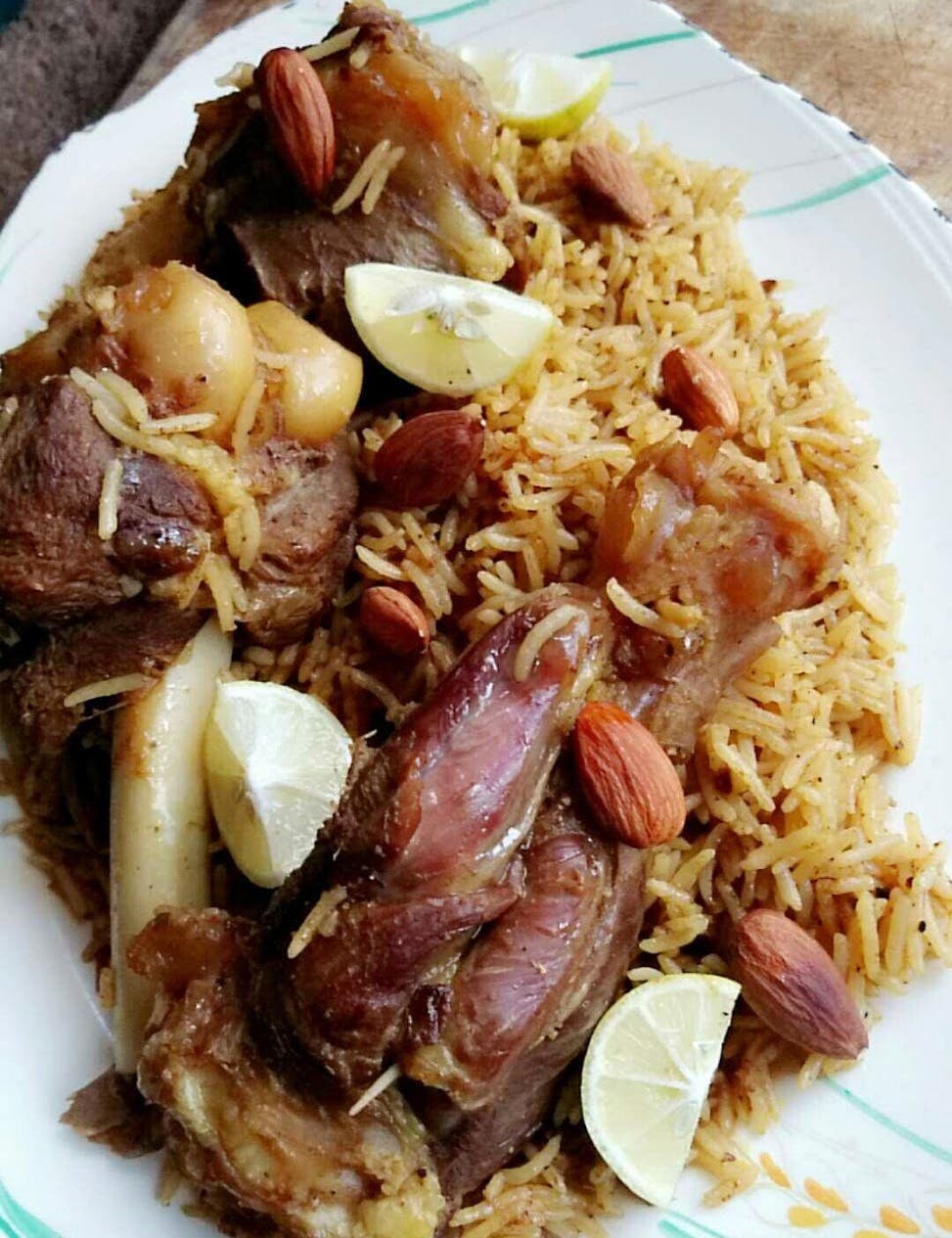
(The tastes of Arabia have also invaded a vegetarian food favored city like Chennai.)
Kerala’s aroma
The aroma of Arabian food also waft across the state of Kerala, which is home to a major chunk of Gulf NRIs. Cities like Kochi, Calicut, Kannur, Thalassery, Thiruvananthapuram and other smaller towns have a fair amount of hotels serving Arabic cuisine or their versions.
Kuzhimanthi Biryani, similar to mandi, is a big hit in Kochi. City’s newly opened Cabritoz Arabic restaurant, with an Arabic ambience makes you feel as though you have been transported to an Arab land.
In addition to the regulars like shewarma, falafel, grilled meats and machboos accompanied by khuboosand hummus, one can find Arabic salads like fattoush, tabbouleh and of course, mandi.
The seaside city of Calicut also has a fair share of restaurants that has on offer authentic Arabic food. Ambling down the Kozhikode beach and its environs one can find a number of fast food joints and restaurants offering authentic Arabian cuisine to their discerning customers.
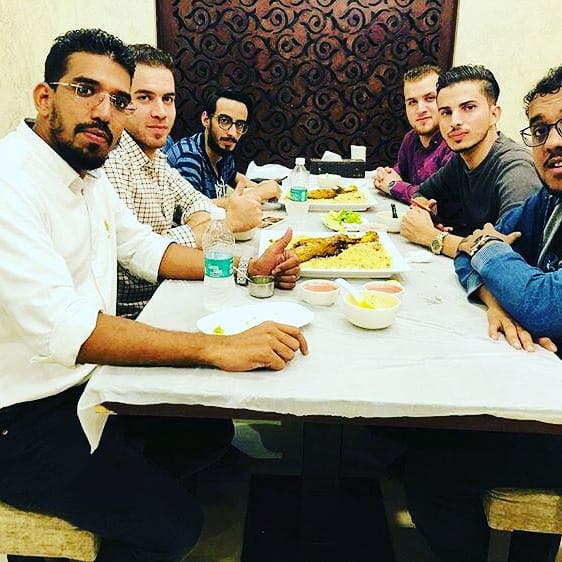
(Arabic food is also getting popular among the youth.)
One of the earliest restaurants serving Arabic food is the Al-Bake Arabic Restaurant on the city’s Mavoor Road. In the Malabar area (with Calicut as hub) of Kerala, mandi has replaced the traditional Malabar Biryani in many weddings and festive occasions. Though the menu is not the exact replica of the quintessential Arabic food, yet the taste is fairly close.
Dammam-based Syed Jamal, who is a regular at such joints during his India visits, says Arabic food is light on the belly. “The sprinkling of powdered dark-red sumac which provide a pleasant lemony spice and tastes especially good on meats such as shish kebabs and on salads enlightens my senses. I am a great fan of mandi. Though the taste here is not very authentic but nevertheless is fairly good,” he says.
Another traditional Arabic dish, kabsa, especially famous in Saudi Arabia, is also a favorite for many. Kabsa gets its flavor from a mixture of intense spices.
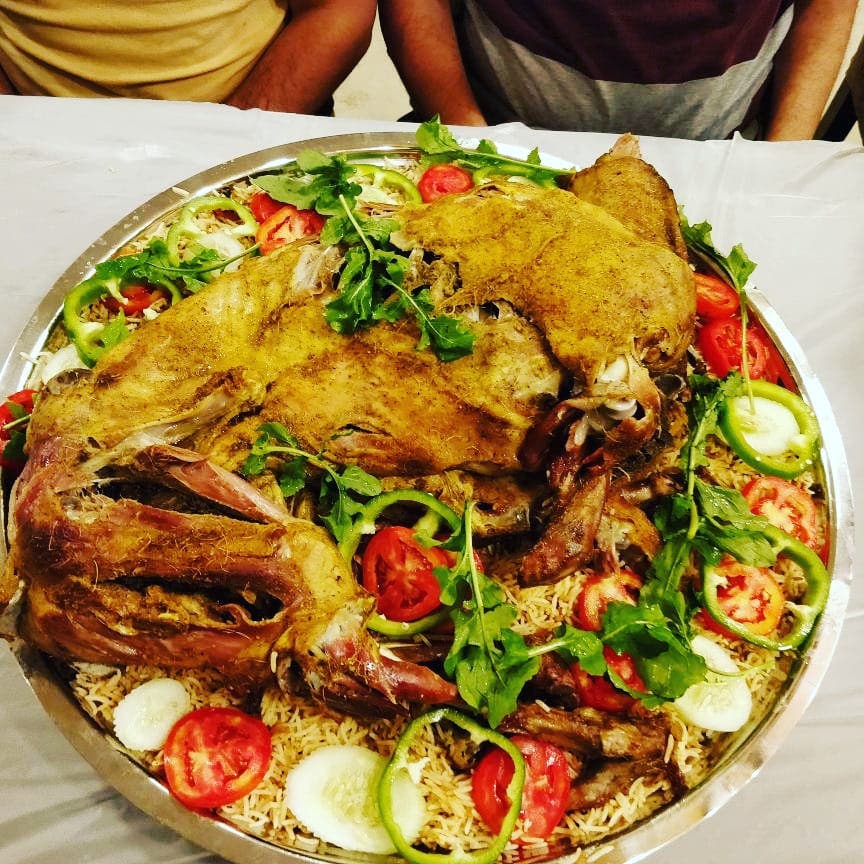
(Kuzhimanthi biryani, similar to mandi, is a big hit in Kochi.)
Mandi rice and kabsa have conquered Bangalore’s taste buds with outlets selling these and other Arabic dishes in several pockets of the city. Mosque Road and its vicinity in Frazer town have a string of Arabic specialty restaurants.
Says Shaad Hasan Damudi, owner of the famous Alibaba café and restaurant, Bangalore, said: “We serve popular rice dishes like kabsa, maqlooba and Egyptian koshari apart from Arabian grills, mezzeh and shewarma. Indians have developed a great taste for Arabia cuisine.”
The tastes of Arabia have also invaded a vegetarian food favored city like Chennai. Mashawi, a restaurant with a presence in Anna Nagar East and Park Town, is known for ouzi, a traditional Arab dish.
This traditional dish entails slow-cooked meat that comes with spiced steamed rice, boiled eggs and potatoes.
courtesy : english.alarabiya.net
Let the Truth be known. If you read VB and like VB, please be a VB Supporter and Help us deliver the Truth to one and all.
United Nations, Apr 19: The US has vetoed a resolution in the UN Security Council on the latest Palestinian bid to be granted full membership of the United Nations, an outcome lauded by Israel but criticised by Palestine as “unfair, immoral, and unjustified".
The 15-nation Council voted on a draft resolution Thursday that would have recommended to the 193-member UN General Assembly “that the State of Palestine be admitted to membership in the United Nations.”
The resolution got 12 votes in its favour, with Switzerland and the UK abstaining and the US casting its veto.
To be adopted, the draft resolution required at least nine Council members voting in its favour, with no vetoes by any of its five permanent members - China, France, Russia, the United Kingdom and the United States.
Palestinian attempts for recognition as a full member state began in 2011. Palestine is currently a non-member observer state, a status that was granted in November 2012 by the UN General Assembly.
This status allows Palestine to participate in proceedings of the world body but it cannot vote on resolutions. The only other non-member Observer State at the UN is the Holy See, representing the Vatican.
Israel’s Foreign Minister Israel Katz praised the US for vetoing what he called a “shameful proposal.”
“The proposal to recognise a Palestinian state, more than 6 months after the largest massacre of Jews since the Holocaust and after the sexual crimes and other atrocities committed by Hamas terrorists was a reward for terrorism”, Katz wrote on X, after the US veto.
US Ambassador Robert Wood, Alternative Representative for Special Political Affairs, said in the explanation of the vote at the Security Council meeting on Palestinian membership that Washington continues to strongly support a two-state solution.
“It remains the US view that the most expeditious path toward statehood for the Palestinian people is through direct negotiations between Israel and the Palestinian Authority with the support of the United States and other partners,” he said.
“This vote does not reflect opposition to Palestinian statehood, but instead is an acknowledgement that it will only come from direct negotiations between the parties.”
Wood said there are “unresolved questions” as to whether Palestine meets the criteria to be considered a State.
“We have long called on the Palestinian Authority to undertake necessary reforms to help establish the attributes of readiness for statehood and note that Hamas - a terrorist organisation - is currently exerting power and influence in Gaza, an integral part of the state envisioned in this resolution,” he said, adding that “For these reasons, the United States voted “no” on this Security Council resolution.”
Wood noted that since the October 7 attacks last year against Israel by Hamas, US President Joe Biden has been clear that sustainable peace in the region can only be achieved through a two-state solution, with Israel’s security guaranteed.
"There is no other path that guarantees Israel’s security and future as a democratic Jewish state. There is no other path that guarantees Palestinians can live in peace and with dignity in a state of their own. And there is no other path that leads to regional integration between Israel and all its Arab neighbours, including Saudi Arabia,” he said.
The Palestinian Authority President, Mahmoud Abbas, sharply criticised the US veto, saying that it was “unfair, immoral, and unjustified, and defies the will of the international community, which strongly supports the State of Palestine obtaining full membership in the United Nations.”
Riyad Mansour, Permanent Observer of the State of Palestine, said that “our right to self-determination has never once been subject to bargaining or negotiation.
“Our right to self-determination is a natural right, a historic right, a legal right. A right to live in our homeland Palestine as an independent state that is free and that is sovereign. Our right to self-determination is inalienable...,” he said.
Getting emotional and choking up as he made the remarks, Mansour said that a majority of the Council members “have risen to the level of this historic moment” and have stood “on the side of justice, freedom and hope.”
He asserted that Palestine’s admission as a full member of the UN is an “investment in peace.”
On April 2, 2024, Palestine again sent a letter to UN Secretary-General Antonio Guterres requesting that its application for full UN membership be considered again.
For a State to be granted full UN membership, its application must be approved both by the Security Council and the General Assembly, where a two-thirds majority of the members present and voting is required for the State to be admitted as a full member.
Earlier in the day, Guterres, in his remarks to a Council meeting on the Middle East, warned that the region is on a “knife edge”.
“Recent escalations make it even more important to support good-faith efforts to find lasting peace between Israel and a fully independent, viable and sovereign Palestinian state,” Guterres said.
“Failure to make progress towards a two-state solution will only increase volatility and risk for hundreds of millions of people across the region, who will continue to live under the constant threat of violence,” he said.
The UN, citing the Ministry of Health in Gaza, said that between October 7 last year and April 17, at least 33,899 Palestinians have been killed in Gaza and 76,664 Palestinians injured. Over 1,200 Israelis and foreign nationals, including 33 children, have been killed in Israel, the vast majority on October 7.
As of April 17, Israeli authorities estimate that 133 Israelis and foreign nationals remain captive in Gaza, including fatalities whose bodies are withheld.

